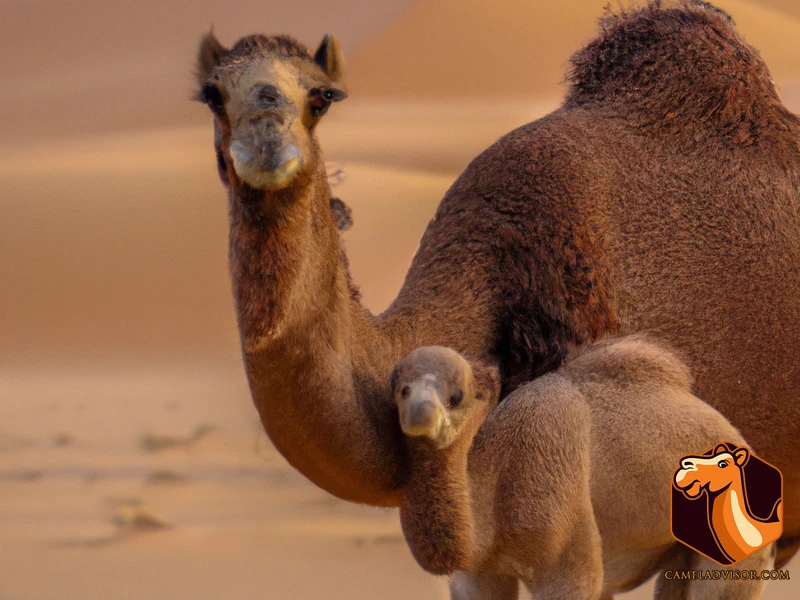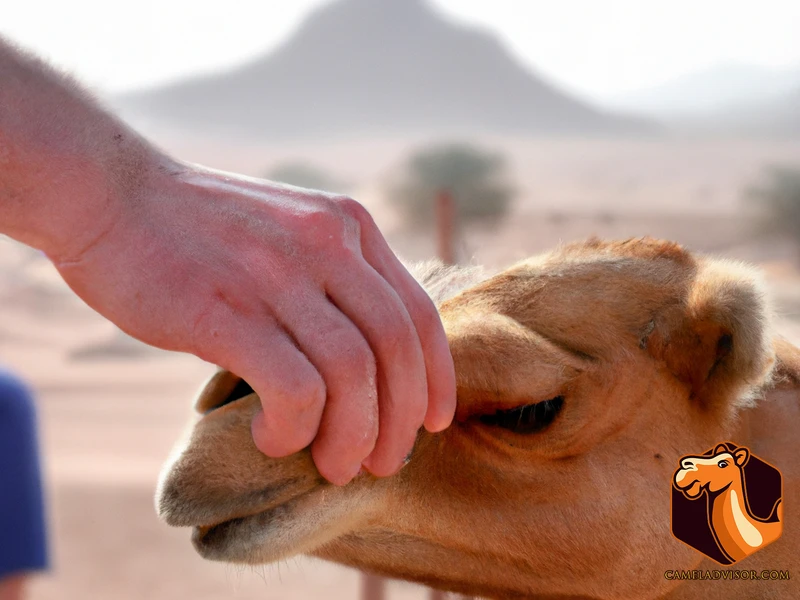Welcoming a newborn camel into your family can be an exciting and perplexing experience. While these majestic animals are adorable and amazing creatures, they do require special care and attention in order to thrive. As a camel owner, it is your responsibility to provide them with a safe and comfortable living environment, handle them properly, maintain their hygiene and health, and be familiar with potential health issues that may arise. In this article, we will guide you through the essential handling and care guidelines you need to follow to create a warm and loving home for your newborn camel.
Contents
- Things You Need to Prepare For Your Newborn Camel
- Proper Handling
- Camel Hygiene
- Common Ailments and Health Issues in Newborn Camels
- Conclusion
-
Frequently Asked Questions
- What is the gestation period of a camel?
- When should a newborn camel begin to stand and walk?
- Can newborn camels stay with their mother all the time?
- Do newborn camels need to be bottle-fed?
- How often should a newborn camel be fed?
- What kind of bedding is best for a newborn camel?
- Should a newborn camel be bathed?
- What is a proper diet for a newborn camel?
- Are there any preventative measures to avoid common health issues in newborn camels?
- When should a newborn camel be vaccinated?
- References
Things You Need to Prepare For Your Newborn Camel

Preparing for a new addition to your family is always an exciting time, but it can also be challenging. This is especially true if you are getting a newborn camel. Raising a healthy and happy camel takes a lot of effort and careful planning. To ensure that you and your new camel are off to a great start, there are several things you need to prepare. These include setting up proper shelter, stocking up on feeding supplies, providing comfortable bedding, and having medical supplies on hand. To learn more about how to prepare for your newborn camel and give it the best start in life, continue reading. You can also check out our article on newborn camel care for more information.
Shelter
When it comes to shelter for a newborn camel, it is important to provide a safe and secure environment for the animal to rest and grow in. There are a few things to consider when preparing a shelter for a newborn camel:
- Size: The shelter should be spacious enough for the camel to move around comfortably. A minimum of 100 square feet of floor space is recommended.
- Temperature: Camels can tolerate extreme temperature fluctuations, but it is important to provide a shelter that offers protection from direct sunlight and heat.
- Protection from the elements: The shelter should be equipped with a roof that is waterproof to protect the newborn camel from rain or snow.
- Ventilation: The shelter should be well-ventilated to ensure the camel is breathing fresh air and not inhaling dust or other particles.
- Cleanliness: The shelter should be kept clean, dry, and free from debris or sharp objects that could harm the newborn camel.
It is important to create a safe and secure environment for the newborn camel to reduce the risk of injury or illness. The shelter should be located in an area away from potential sources of danger, including traffic, other animals, and hazardous materials. Additionally, regular cleaning and disinfecting of the shelter can help prevent infections and other health problems from developing.
Feeding Supplies
When it comes to feeding supplies for newborn camels, there are a few essentials to have on hand. These include:
| Bottles and Nipples | It’s important to have several durable bottles and nipples specifically designed for camel milk. These can be purchased at a livestock supply store or online. The nipples should closely mimic the mother camel’s teat, to ensure the newborn can easily latch and drink. |
| Colostrum Replacer | Colostrum is the first milk produced by a mother camel after giving birth. It contains essential antibodies and nutrients that help boost the newborn’s immune system. In the event that the mother camel cannot provide her own colostrum, a colostrum replacer should be on hand. This can also be purchased at a livestock supply store. |
| Milk Replacer | Newborn camels will need to be fed 8-10 times per day for the first few weeks of their life. Camel milk can be difficult to come by, so a milk replacer specifically formulated for baby camels should be available. These can also be purchased at a livestock supply store. |
| Scale | Weighing the newborn camel before and after feedings can help ensure they are getting the proper amount of milk. A simple scale can be purchased online or from a kitchen supply store. |
It’s important to keep all feeding supplies clean and sanitized to prevent infections. For more information on preventing infections in newborn camels, check out our article on preventing infections. Additionally, it’s important to follow a proper feeding schedule, and to be prepared to bottle feed if necessary.
Bedding and Comfort
One of the essential things to prepare for your newborn camel is comfortable bedding. Bedding materials can include sand, straw, or wood shavings. It is important to ensure that the bedding is not damp, as this can lead to health problems for your camel. Additionally, the bedding should be cleaned and replaced frequently.
When choosing a comfortable sleeping area for your camel, make sure it is large enough for the camel to move around, lay down and stand up comfortably. A dry and warm area is vital for your newborn camel’s comfort and health. A heat lamp can be used, but make sure it is placed well out of reach of the camel and is in a position that won’t cause the bedding to catch fire.
To add to your newborn camel’s comfort, provide fresh water at all times. Young camels will drink often, and clean water helps to prevent dehydration. You also want to make sure that the water is clean and changed frequently to prevent the spread of bacteria.
Lastly, give your newborn camel some toys to play with. These can be anything from a ball to a wooden block. The toys will keep the camel entertained, thus avoiding boredom and leading to increased activity.
It is important to keep your newborn camel healthy and comfortable. With the right bedding, water, and toys, your camel will be well-rested, active and happy. To learn more about caring for newborn camels, kindly refer to our detailed guide on camel care.
Medical Supplies
When preparing for your newborn camel, it is crucial to have proper medical supplies on hand. You should always consult with a veterinarian for guidance on specific supplies you may need, but here are some essential medical supplies to consider:
| Medical Supplies | Function |
| Thermometer | To monitor body temperature and detect fever |
| Electrolyte solution | To combat dehydration in case of diarrhea or other illnesses |
| Colostrum supplement | To provide essential nutrients and immune support for the first few days of life |
| Antibiotics | To treat bacterial infections |
| Dewormer | To prevent and treat parasitic infections |
| Topical wound treatment | To disinfect cuts and abrasions and promote healing |
| Leash and collar | To safely restrain your camel for medical treatment |
It is important to keep these supplies in a secure, designated area that is easily accessible in case of an emergency. This area should also be kept clean and organized to maintain the sterility of the medical supplies.
Proper Handling
Welcoming a newborn camel into your care might be an exciting moment. However, it’s crucial to conduct proper handling and care to ensure the health and safety of the camel. To help you handle your newborn camel effectively, we have prepared some essential tips that you should keep in mind. By following our guidelines, you can reduce the risk of injury or stress on both yourself and your camel, allowing for a smooth transition into your care.
Observing their Behavior
Observing the behavior of newborn camels is essential in ensuring their well-being. Here are some things to keep in mind:
- Watch for signs of distress: Newborn camels can be easily stressed, which can affect their health. Watch for signs of distress such as excessive crying, restlessness, or unresponsiveness.
- Observe their feeding habits: Camel mothers will typically nurse their young for the first few months, but it’s important to make sure the newborn is actually getting enough milk. Keep an eye out for suckling behavior and vigorous nursing.
- Pay attention to their stool: The stool of a newborn camel can provide important information about their health. Abnormalities such as diarrhea, constipation, or the presence of blood in the stool can be signs of underlying issues.
- Monitor their activity level: Newborn camels should be relatively active and curious about their surroundings. If you notice excessive lethargy or a lack of interest in their environment, it could be a sign of illness.
- Watch for signs of injury: Newborn camels may be prone to injuries such as cuts or bruises. If you notice any signs of injury, such as bleeding or reluctance to stand or walk, take appropriate action.
By observing the behavior of your newborn camel, you can quickly identify potential issues and take the necessary steps to keep them healthy and happy.
Picking the right time of day
Choosing the appropriate time of day to handle a newborn camel is crucial as it can impact the bonding between the caretaker and the camel. Below are some factors to consider while choosing the right time of day:
- Time when the mother is away: It is best to pick a time when the mother is away to ensure uninterrupted time with the calf. It can be either when the mother is taken out for grazing or when she is resting away from the calf.
- Avoiding extreme temperatures: It is advisable to avoid handling the calf during the hottest part of the day as camels are sensitive to heat, and the calf may get exhausted quickly. Similarly, it is better not to handle them during the coldest part of the day or night.
- Settled time: Choose a time when the calf is settled and not restless or agitated. When the calf has recently fed and is relaxed, it is the ideal time to handle them.
- Consistent routine: It’s essential to follow a consistent routine with the calf to establish a trusting relationship. Stick to a fixed time of day for handling, feeding and other activities, as it can help to build trust between the caretaker and the newborn camel.
- Quiet and peaceful surroundings: The surroundings play a crucial role in handling newborns; therefore, it is essential to select a quiet and peaceful environment to avoid distractions or disturbances that may agitate the calf, leading to unnecessary stress.
By picking the right time of day, you can ensure a positive experience while handling the newborn camel and facilitate a strong bond with them.
Approaching Calmly and Confidently
Approaching a newborn camel calmly and confidently is crucial for building a positive relationship with them. Moving too quickly or making sudden movements can startle the camel and make them feel uneasy. To approach them in a stress-free way, try following these steps:
| Step | Explanation |
|---|---|
| Step 1: | Before approaching a camel, make sure they can see and hear you. Slowly approach from the front or side, not from behind. |
| Step 2: | Speak gently and softly to the camel, calling them by name if they have one. This will help them recognize you and feel more at ease. |
| Step 3: | Keep your hands visible and avoid making any sudden movements. This will help the camel feel more comfortable around you and prevent any potential defensive behaviour. |
| Step 4: | Approach the camel slowly, observing their reaction closely. If they show signs of discomfort, take a step back and try again later. Patience is key! |
| Step 5: | Once you are close to the camel, start interacting with them in a gentle and calming manner. This could include touching them or talking to them softly. |
| Step 6: | If the camel is still uncomfortable or appears agitated, give them some space and try again later. It is important to build trust gradually and not overwhelm the camel. |
Remember, developing a positive relationship with your newborn camel starts with approaching them calmly and confidently. This sets the tone for all future interactions and can help ensure you have a happy and healthy camel!
Restraint
One of the most important aspects of handling newborn camels is knowing how to properly restrain them. This ensures both the safety of the caretaker and the health of the camel. There are different methods of restraint that can be used depending on the situation. Here are some examples:
| Method of Restraint | When to Use | How to Do It |
|---|---|---|
| Head Restraint | When administering medication or performing medical procedures | Hold the camel’s head firmly but gently to prevent movement |
| Hobbles | When handling the lower legs or feet | Use specially designed hobbles to immobilize the legs |
| Neck and Body Restraint | When performing routine grooming or shearing | Use a specially designed harness to secure the body and neck |
It’s important to note that restraint should always be done with care and consideration for the animal’s well-being. If the camel appears to be distressed or uncomfortable, it’s important to stop and reassess the situation before proceeding. Proper handling and restraint can greatly aid in the care and health of newborn camels.
Feeding Guidelines
To make sure your newborn camel gets the proper nutrition, it’s essential to follow these feeding guidelines:
- Provide Fresh Water: Clean and fresh water should always be available to your newborn camel. Make sure to clean their water container/s regularly.
- Feed on Colostrum: In the first 24 hours after birth, a newborn camel should be fed colostrum, the first milk produced by the mother, which contains essential nutrients and antibodies to boost their immune system.
- Introduce Solid Food Gradually: After the first 24 hours, introduce solid food gradually. Start with small amounts of hay and then add commercially formulated pellets or grains designed specifically for camels. Overfeeding may cause digestive issues in newborn camels.
- Monitor their Eating Habits: Keep an eye on your newborn camel’s eating habits. If they aren’t eating enough or experiencing digestive issues, seek veterinary advice.
- Provide Access to Roughage: Camels require regular access to roughage, such as hay or grass, to aid their digestive system.
- Feed Frequently: Newborn camels have small stomachs and require frequent feeding. Aim for 6 to 8 small feeds per day during the first week or two of their lives.
By following these feeding guidelines, you can help ensure that your newborn camel gets the nutrients and hydration they need to stay healthy and develop properly.
Camel Hygiene

The cleanliness and hygiene of newborn camels are crucial aspects of their overall well-being. These desert animals require proper grooming and sanitation to ensure that they remain healthy and happy. From bathing and dental care to washing and cleaning their feeding supplies, this section will highlight the essential steps that you need to take to maintain the hygiene of your baby camels. Let’s delve into the details of camel hygiene with great care and attention!
Bathing and Grooming
Proper bathing and grooming are important aspects of camel care that should not be neglected. Here are some essential grooming tips for taking care of your newborn camel:
- Brushing: Use a soft-bristled brush to gently groom your camel’s hair. This helps to remove dirt, debris and loose hair from the coat while also stimulating blood circulation.
- Bathing: Newborn camels do not require frequent baths, but it is important to give them a bath whenever they get too dirty. Use lukewarm water and a mild soap to avoid irritating their sensitive skin. Rinse thoroughly to ensure there is no soap left behind.
- Trimming: Regular trimming of the camel’s hair is necessary to prevent tangling and matting. Use a camel hair clipping machine to trim the hair properly. Be careful not to cut the skin while clipping the hair.
- Checking for Parasites: Regularly check your camel’s coat for ticks, fleas, and other parasites. Use a fine-toothed comb to remove any parasites that you see in the coat. Use a recommended medication to control the parasite infestation if needed.
- Cleaning: Keeping the camel’s area clean is important to prevent infections. Clean the area where the camel stays frequently using a disinfectant, and remove any droppings and debris from the area.
Remember, proper hygiene for your newborn camel is essential to keep them healthy and happy. Bathing, grooming, and cleaning their living area will help them to avoid infections and parasites. Follow these guidelines to keep your newborn camel clean and healthy.
Hoof and Dental Care
Maintaining proper hoof and dental care for newborn camels is crucial to their growth and well-being. Here are some guidelines to help ensure the health of your newborn camel’s hooves and teeth:
| Hoof Care | Dental Care |
|---|---|
| Inspect the hooves regularly to ensure that there are no signs of injury, such as cracks or chips. | Check the teeth regularly to ensure proper alignment and wear. Misaligned teeth can cause chewing problems and other complications. |
| Trim the hooves regularly to prevent overgrowth and discomfort. Baby camels typically need their hooves trimmed every 4-6 weeks. | Provide a balanced diet to ensure healthy teeth development. Camelids need roughage to wear down their teeth properly. |
| Monitor the baby camel’s movement to ensure its hooves don’t become overgrown or distorted from compensating for other problems. | Provide toys, such as tree branches or other suitable objects, for the baby camel to gnaw on to help wear down their teeth and prevent overgrowth. |
| Wash the hooves regularly to keep them clean and prevent microbial infections. | Regularly check the soft tissue inside the mouth for any signs of problems, such as inflammation or sores. These could indicate a dental problem that needs attention. |
By following these guidelines, you can help ensure that your newborn camel’s hooves and teeth are well taken care of, promoting their overall health and well-being.
Washing and Cleaning Food and Water Containers
Keeping the food and water containers of newborn camels clean is essential for their health and wellbeing. Using dirty containers can introduce harmful bacteria and parasites, leading to various health problems. Here are some essential steps for washing and cleaning the containers:
- Step 1: Remove leftover food and water
- Step 2: Rinse the containers with hot water
- Step 3: Use a suitable cleaning solution
- Step 4: Dry the containers completely
- Step 5: Clean the containers regularly
Before cleaning the containers, remove any leftover food or water. This prevents any dirt or debris from sticking to the container during cleaning.
Rinse the containers with hot water. Hot water helps to loosen any sticky residue or debris. You can also use a brush or sponge to scrub the containers gently if there is any stubborn grime.
Use a cleaning solution suitable for the containers. Some cleaning solutions may be harsh and can damage the container. You can use a mild detergent or dish soap to clean the containers. Make sure to rinse the containers thoroughly with hot water to remove any soap residue.
After washing and rinsing, dry the containers completely before filling with food or water. Leaving any moisture behind can lead to the growth of harmful bacteria and other microorganisms.
It is essential to clean the food and water containers regularly. This ensures that there is no buildup of dirt and bacteria. Cleaning the containers at least once a week is recommended to maintain good hygiene.
By following these simple steps, you can ensure that the food and water containers of your newborn camel are always clean and hygienic. Clean food and water containers go a long way in keeping your camel healthy and happy.
Common Ailments and Health Issues in Newborn Camels
As a responsible owner of a newborn camel, it’s important to be aware of the potential health issues and ailments that may affect your furry friend. Unfortunately, just like any other animal, newborn camels are also susceptible to various illnesses and conditions that may require immediate medical attention. In this section, we will discuss some of the most common ailments and health issues that your newborn camel may encounter, and provide you with the necessary information to identify and address any potential health concerns. So, let’s delve into the world of camel health and learn how to keep your furry friend healthy and happy.
Diarrhea
One of the most common health concerns for newborn camels is diarrhea. It is important to monitor their bowel movements closely, especially during the first few weeks of life. An early sign of diarrhea is the consistency and color of their feces. Normal feces should be firm and have a greenish-brown color. If their feces have a runny consistency, a yellow color, and a strong smell, it may be an indication of diarrhea.
| Cause | Symptoms | Treatment |
|---|---|---|
| Overfeeding | Loose, watery stool; digestive discomfort; loss of appetite; dehydration | Limit feeding amount; add electrolytes and probiotics to diet; monitor hydration levels |
| Bacterial or viral infection | Watery stool; loss of appetite; lethargy; fever; dehydration | Consult with a veterinarian for appropriate antibiotics; provide electrolytes and fluids to prevent dehydration |
| Parasites | Watery stool; loss of appetite; weight loss; dehydration | Medication prescribed by a veterinarian to deworm camel; provide electrolytes and fluids to prevent dehydration |
If the diarrhea persists for more than 24-48 hours, it is crucial to contact a veterinarian for proper diagnosis and treatment. Untreated diarrhea can lead to dehydration, malnutrition, and other health complications. Additionally, prevent outbreaks of diarrhea by ensuring that the camel’s living environment is clean and sanitized regularly.
Respiratory Problems
Respiratory problems in newborn camels can be life-threatening and require immediate attention. It is important to keep an eye on your camel’s breathing and behavior and to seek veterinary care if there are any concerns. Here are some common respiratory problems to be aware of:
| Respiratory Problem | Symptoms | Treatment |
|---|---|---|
| Bronchitis | Weakness, coughing, nasal discharge, decreased appetite | Antibiotics to treat the infection and anti-inflammatory medications to reduce inflammation in the airways. Rest and supportive care. |
| Pneumonia | Difficulty breathing, coughing, nasal discharge, fever, decreased appetite | Antibiotics to treat the infection, supportive care, and sometimes oxygen therapy to help with breathing. |
| Upper Respiratory Tract Infection | Coughing, nasal discharge, sneezing | Antibiotics if there is a bacterial infection, rest, and supportive care. |
| Asthma | Coughing, wheezing, difficulty breathing, rapid breathing | Corticosteroids to reduce inflammation in the airways, bronchodilators to open up the airways, and rest. |
Prevention is key when it comes to respiratory problems in newborn camels. Keep their living area clean and dry, and minimize exposure to other animals who may be sick. Proper nutrition and hydration can also help support their immune system and overall health. If you notice any symptoms of respiratory problems in your newborn camel, seek veterinary care immediately.
Parasites
Parasites are common in newborn camels, and they can lead to poor health and even death if not treated promptly. It is important to keep a close eye on your camel and watch for any signs of a parasitic infection.
There are several types of parasites that can affect newborn camels. These include:
| Parasite | Symptoms | Treatment |
| Coccidiosis | Diarrhea, weight loss, dehydration | Treatment with medication such as sulfadimethoxine or amprolium |
| Roundworms | Abdominal pain, loss of appetite, weight loss | Deworming medication such as ivermectin or fenbendazole |
| Tapeworms | Weight loss, diarrhea, abdominal pain | Medication such as praziquantel or epsiprantel |
| Lice and mites | Itching, hair loss, skin irritation | Treatment with insecticide or parasiticides |
If you notice any of these symptoms or suspect your newborn camel may have a parasitic infection, it is important to consult with a veterinarian as soon as possible. They can diagnose the type of parasite and provide the appropriate treatment.
Preventative measures can also be taken to reduce the risk of parasitic infections. These include regular deworming, keeping bedding and living areas clean, and providing clean water and food in clean containers.
Taking these measures and being vigilant about your newborn camel’s health can help prevent and treat any parasitic infections they may encounter.
Bloat
Bloat is a potentially life-threatening condition that can occur in newborn camels. This happens when too much gas builds up in their stomach, causing it to expand and putting pressure on their other organs. It is essential to recognize the signs of bloat early on to prevent any complications from arising. Here are some things to keep in mind:
Symptoms:
- Swollen belly
- Difficulty breathing
- Loss of appetite
- Lethargy
Causes:
- Overfeeding
- Rapid feeding
- Consuming too much fresh or green food
- Inadequate exercise
Prevention:
- Feed small and frequent meals
- Avoid feeding too much fresh or green food
- Allow for regular exercise and movement
Treatment:
- Consult with a veterinarian right away
- Administer medications as prescribed by the veterinarian
- The vet may also perform a procedure called a “trocarization” to relieve the gas pressure
It is crucial to note that bloat can be fatal if not treated promptly. It is essential to contact a veterinarian as soon as possible if you suspect your newborn camel is experiencing any of the symptoms listed above.
Other potential health issues
As a newborn camel owner, it’s important to be aware of the potential health issues that may arise. In addition to diarrhea, respiratory problems, parasites and bloat, there are other health issues that you should be on the lookout for. Some of these include:
- Joint problems: Newborn camels can experience joint problems, especially if they are born with a large birth weight or if they suffer from a difficult birth. Signs of joint problems include limping or stiffness.
- Heat stress: Camels are adapted to live in hot, arid environments, but excessive heat can still cause them stress. Signs of heat stress include panting, lethargy, and loss of appetite.
- Muscle weakness: Camels need regular exercise to maintain their muscle tone. A lack of exercise can cause muscle weakness, which can lead to a variety of other health problems.
- Eye infections: Newborn camels are susceptible to eye infections, especially if they are born in dusty or dirty environments.
- Dehydration: Like all animals, camels need access to clean, fresh water. Dehydration can lead to a variety of health problems, including heat stress and digestive issues.
By being aware of these potential health issues, you can take steps to prevent them from occurring or catch them early before they become more serious. Remember that if you notice any unusual symptoms or behaviors in your newborn camel, it’s important to consult with a veterinarian as soon as possible.
Conclusion
In conclusion, taking care of newborn camels may seem daunting at first, but with proper preparation and handling, it can be a rewarding and fulfilling experience. It is important to provide them with a suitable shelter, feeding supplies, bedding and comfort, and medical supplies.
When handling newborn camels, it is essential to observe their behavior, pick the right time of day, approach calmly and confidently, and practice restraint when necessary. Following proper feeding guidelines and maintaining their hygiene through bathing, grooming, and washing and cleaning their food and water containers can also help prevent common ailments and health issues.
However, it is important to remember that even with the best care, newborn camels can still experience health issues such as diarrhea, respiratory problems, parasites, bloat, and others. It is important to be aware of the signs and symptoms and seek veterinary care when necessary.
Overall, caring for newborn camels requires patience, consistency, and a willingness to learn and adapt. Building a strong bond with these animals can be a truly amazing experience and a rewarding opportunity for any animal lover.
Frequently Asked Questions
What is the gestation period of a camel?
The gestation period of a camel is roughly 12-14 months.
When should a newborn camel begin to stand and walk?
Newborn camels typically begin to stand and walk within the first hour after birth.
Can newborn camels stay with their mother all the time?
Yes, newborn camels should be with their mother at all times for the first few months of their life.
Do newborn camels need to be bottle-fed?
No, newborn camels do not need to be bottle-fed if they are with their mother and she is able to nurse them.
How often should a newborn camel be fed?
If bottle-fed, a newborn camel should be fed every 4-6 hours until they are able to consume enough milk from their mother on their own.
What kind of bedding is best for a newborn camel?
Clean and dry straw or hay is the best type of bedding for a newborn camel.
Should a newborn camel be bathed?
No, a newborn camel should not be bathed unless there is a specific medical need for it.
What is a proper diet for a newborn camel?
A newborn camel’s diet should consist of its mother’s milk until it is old enough to consume solid foods.
Are there any preventative measures to avoid common health issues in newborn camels?
Ensuring proper nutrition and preventing stress can both be helpful in avoiding common health issues in newborn camels.
When should a newborn camel be vaccinated?
Vaccinations for camels vary based on location and specific risks. Consult with a veterinarian to determine the appropriate vaccination schedule for your newborn camel.







